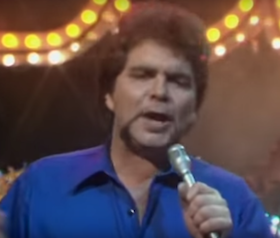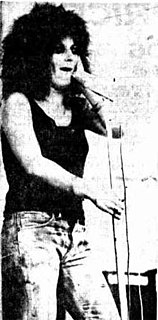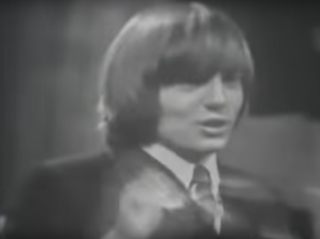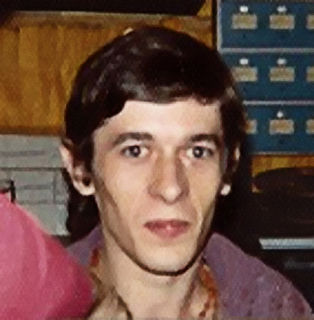Related Research Articles

Johnny Young is a Dutch Australian singer, composer, record producer, disc jockey, television producer and host. Originally from Rotterdam, The Netherlands, his family settled in Perth in the early 1950s. Young was a 1960s pop singer and had a number-one hit with the double-A-sided, "Step Back" and a cover of the Strangeloves' "Cara-lyn" in 1966. Young's profile was enhanced by a concurrent stint as host of TV pop music program The Go!! Show. Also in the mid-1960s, Young toured with the Rolling Stones and supported Roy Orbison.
Rock music in Australia, also known as Oz rock, Australian rock and Aussie rock, is rock music from Australia. The nation has a rich history of rock music and an appreciation of the roots of various rock genres, usually originating in the United States or Britain, but also continental Europe, and more recently the musical styles of Africa. Australian rock has also contributed to the development of some of these genres, as well as having its own unique Australiana sound with pub rock and its indigenous music.

Peter Criss is the 1978 debut solo album by Peter Criss, the drummer of American hard rock band Kiss. It was one of four solo albums released by the members of Kiss on September 18, 1978. The album was produced by Vini Poncia, who went on to produce the Kiss albums Dynasty (1979) and Unmasked (1980). Criss covered "Tossin' and Turnin'", which was a No. 1 hit for Bobby Lewis in the U.S. during the summer of 1961. The song was subsequently covered by Kiss on their 1979 tour.
The Purple Hearts were an Australian R&B, rock group, formed in Brisbane as the Impacts in 1964. The band included lead vocalist Mick Hadley, lead guitarist Barry Lyde, rhythm guitarists Paul Steffen (1964–65) and Fred Pickard (1965-66), bassist Bob Dames, and drummers Adrian "Red" Redmond (1964–66) and Tony Cahill (1966-67). The group issued an extended play, The Sound of the Purple Hearts (1966), and several singles, including "Long-legged Baby" (1965) and "Early in the Morning" (1966). They disbanded early in 1967.

Barry John Stanton was an English-Australian rock and roll musician. He performed on pop music programs, Six O'Clock Rock, Bandstand, Johnny O'Keefe Show, Sing Sing Sing, Saturday Date, and Woody's Teen Time. He issued a compilation album, A Tribute to the King Rare Songs 1957-1965, in 1988.
Ronald Leslie BurnsAM is an Australian rock singer-songwriter and musician. He fronted the Melbourne band "The Flies" in the early 1960s, followed by a solo career into the 1970s and was a member of Burns Cotton & Morris in the 1990s. He retired from performing in 2000. His solo hit single, "Smiley" peaked at number two on the Go-Set National Top 40 in 1970. On 10 June 2013 Burns was awarded a Member of the Order of Australia with the citation "For significant service to the community, particularly to children recovering from illness and trauma, and to the entertainment industry".
The Flying Circus were an Australian pop and country rock band with founding mainstays, Doug Rowe on lead guitar and vocals and Colin Walker on drums. They had three top 30 pop hits, "Hayride", "La La" and "Run Run Run", in Australia from 1968 to 1971. These were not typical of their live work nor later recordings. They re-located to Canada from 1971 to 1974 where they achieved chart success with "Old Enough " and "Maple Lady". Doug Rowe died in July 2015.

Douglas John Parkinson was an Australian pop and rock singer. He led the bands Strings and Things/A Sound (1965), the Questions (1966–1968), Doug Parkinson in Focus, Fanny Adams (1970–1971), the Life Organisation (1973), Southern Star Band (1978–1980) and Doug Parkinson Band (1981–1983). Doug Parkinson in Focus's cover version of the Beatles' track "Dear Prudence" peaked at No. 5 on the Go-Set National Top 40. The follow up single, "Without You" / "Hair" (October), also reached No. 5. Parkinson released solo material and performed in musical theatre productions.
The Groove was an Australian R&B, pop group which formed in early 1967 with the lineup of Geoff Bridgford on drums, Jamie Byrne on bass guitar, Tweed Harris on keyboards, Rod Stone on guitar and Peter Williams on lead vocals and guitar. In December 1967 their single, "Simon Says", peaked at No. 17 on the Go-Set National Top 40 Singles Chart. They followed with "Soothe Me", which peaked at No. 14 in April 1968. Also in April they released their self-titled debut album. In July that year they won the national final of the Hoadley's Battle of the Sounds competition with the prize including a trip to London. They relocated there in March 1969, and early the following year they changed their name to Eureka Stockade, they disbanded in 1971. On 13 October 2004 Tweed Harris died of throat cancer, aged 63.
Chain are an Australian blues band formed as The Chain in late 1968 with a line-up including guitarist and vocalist Phil Manning and lead vocalist Wendy Saddington. Saddington left in May 1969 and in September 1970 Matt Taylor joined on lead vocals and harmonica. During the 1990s they were referred to as Matt Taylor's Chain. Their single, "Black and Blue", is their only top twenty hit. It was written and recorded by the line-up of Manning, Taylor, Barry Harvey on drums and Barry Sullivan on bass guitar. The related album, Toward the Blues, followed in September and peaked in the top ten. Manfred Mann's Earth Band covered "Black and Blue" on their 1973 album Messin'.

Wendy June Saddington, also known as Gandharvika Dasi, was an Australian blues, soul and jazz singer, and was in the bands Chain, Copperwine and the Wendy Saddington Band. She wrote for teen pop newspaper Go-Set from September 1969 to September 1970 as an agony aunt in her weekly "Takes Care of Business" column, and as a feature writer. Saddington had Top 30 chart success with her 1972 solo single "Looking Through a Window", which was written and produced by Billy Thorpe and Warren Morgan of the Aztecs. After adopting Krishna Consciousness in the 1970s she took the name Gandharvika Dasi. In March 2013 she was diagnosed with oesophageal cancer, and died on 21 June, aged 63.

Michael Alexander Furber was an English-born Australia entertainer popular in the mid-1960s as the lead singer of Mike Furber and the Bowery Boys. Furber's group had hits with "Just a Poor Boy", "You Stole My Love" and "That's When Happiness Began". In the Go Set Pop Poll, Furber was voted in the top 5 as most popular Male Vocalist in both 1966 and 1967. Furber's subsequent solo singing career was less successful and in the early 1970s he turned to stage musicals: including Godspell and Nuclear. According to police investigators Furber committed suicide on 10 May 1973, by hanging, in the garage of his home. Rock music historian, Ian McFarlane, writes, "Reputedly in the depths of depression, he hanged himself... It has been suggested, however, that Furber was actually murdered because he had befriended a Kings Cross prostitute."

James Vivian Alfred Doyle was an Australian musician, radio presenter and songwriter. He was the founding mainstay guitarist in Ayers Rock (1973–81), a jazz fusion, progressive rock band. As a member of Ayers Rock, Doyle appeared on all three of their studio albums, Big Red Rock (1974), Beyond (1976) and Hotspell (1980). They toured both nationally and internationally including through the United States, where they supported Bachman–Turner Overdrive at a stadium concert with an audience of 35,000 people in Seattle. For the group's third album, Hotspell, Doyle wrote or co-wrote four tracks.

Mark Kennedy is an Australian musician who has been the drummer for several artists including Spectrum (1969–70), Doug Parkinson in Focus (1971), Leo de Castro (1971–73), Ayers Rock (1973–76), Marcia Hines (1976–83), Men at Work (1985), Renée Geyer and Jimmy Barnes (2005).
The Black Diamonds were an Australian garage rock band from Lithgow, New South Wales, which were active under different names from 1959 to 1971. By 1965 the line-up consisted of Glenn Bland on vocals and harmonica, Allen Keogh on bass guitar, Colin McAuley on drums, Alan "Olly" Oloman on lead guitar and vocals, and his younger brother Neil Oloman on rhythm guitar. They signed with Festival Records, where they released two singles. The better-known B-side track, "I Want, Need, Love You", appeared on their first single in 1966 and became a regional hit. It features an pleading vocal over a driving rhythm section and fast guitar breaks. The band toured in support of the Easybeats. In 1967 their second single, "Outside Looking In", was a hit in the Sydney area. In 1968 the group changed their name to Tymepiece and evolved into a more eclectic and progressive style. Briefly changing their name to Love Machine they released a cover version of the Tokens' single, "Lion Sleeps Tonight" (1968). They reverted to Tymepiece and issued an album, Sweet Release, in February 1971 but broke up soon after. According to Australian musicologist, Ian McFarlane, "[they] will be remembered as one of the most ferocious garage/punk outfits Australia ever produced in the 1960s."
Wayne Ian Duncan was an Australian rock musician. In 1970 he was a founding member of the doo-wop band, Daddy Cool, providing bass guitar and backing vocals. They were inducted into the ARIA Hall of Fame in 2006. During his career he had also been a member of the Rondells, Sons of the Vegetal Mother, Gary Young's Hot Dog, Jane Clifton and the Go Go Boys, the Black Sorrows, and the Hornets. In late November 2016 Duncan had a stroke and died a week later, he was survived by his domestic partner, Anne, and by two children. According to Australian music journalist, Ian McFarlane, "Duncan was never a sedate bassist. One only has to listen to some of the latter-day DC material... to hear how inventive his playing could be."

Flake were an Australian pop and rock group which formed in 1968. They released an album, How's Your Mother!, in December 1971 on the Violet's Holiday label, distributed by Festival. The group appeared on the Go-Set National Top 60 singles chart with cover versions of Bob Dylan's "This Wheel's on Fire", Marmalade's "Reflections of My Life", Vanda and Young's "Life is Getting Better" and Honeybus' "Under the Silent Tree". The group disbanded in 1974 but reunited in 1989 to support a compilation album, Reflections: The Festival File Volume Thirteen, before breaking up again in 1991.
Pastoral Symphony were an Australian studio-based pop, rock super group, which formed in 1968. Their sole release was a single, "Love Machine", which is a cover version of American group, the Roosters' track from earlier in that year. The band included members of the Twilights supplemented by additional musicians.
Dave Miller is a New Zealand former rock music singer-songwriter and journalist. He was the founding mainstay of Dave Miller Set, which were based in Australia. Long-term fellow members included Leith Corbett on bass guitar, Mike McCormack on drums and John Robinson on lead guitar. Their cover version of "Mr Guy Fawkes" peaked in the top 30 on the Go-Set national singles chart. The group disbanded early in 1970 and Corbett, McCormack and Robinson founded the fellow rock group, Blackfeather. Miller and Corbett combined for a studio album, Reflections of a Pioneer by Dave Miller/Leith Corbett and Friends. In February 1973 Miller and Robinson briefly revived Dave Miller Set. Before the end of that year Miller travelled to the United Kingdom and worked as a music journalist. He returned to Australia in 1980 and lived in New South Wales. In September 2017 Miller curated a compilation album, Mr Guy Fawkes: Complete Spin Recordings & More 1967-1970, which included tracks by Dave Miller Set and by Dave Miller/Leith Corbett and Friends on CD.
MPD Ltd or M. P. D. Limited were an Australian pop music band formed in 1965 by core members Mike Brady on lead vocals and guitar, Pete Watson on bass guitar and lead vocals, and Danny Finley on drums. They used their first initials to provide the name. Their popular singles were "Little Boy Sad" and "Lonely Boy" (October). MPD Ltd issued an album, The Best of MPD Ltd, in 1966 on Go!! Records before disbanding in 1967. Pete Watson died of an illness on 30 April 1972.
References
- 1 2 3 4 5 6 7 Baker, Glenn A (3 April 2010). "Earthy Voice that Never Failed to Excite". The Sydney Morning Herald . Retrieved 12 June 2018.
- 1 2 3 "Family Notices". The Sydney Morning Herald. No. 32, 743. 5 December 1942. p. 16. Retrieved 12 June 2018– via National Library of Australia.
- 1 2 3 4 5 6 7 8 9 10 11 12 13 14 15 McFarlane, Ian (1999). "Encyclopedia entry for 'Ray Hoff and the Off Beats'". Encyclopedia of Australian Rock and Pop. St Leonards, NSW: Allen & Unwin. ISBN 978-1-86508-072-7. Archived from the original on 30 September 2004.
- ↑ Nuttall, Lyn. "'Little Queenie' – Ray Hoff & the Off Beats (1965)". Where did they get that song?. PopArchives – Sources of Australian Pop Records from the 50s, 60s and 70s (Lyn Nuttall). Archived from the original on 3 May 2017. Retrieved 13 June 2018.
- ↑ McFarlane, Ian (1999). "Encyclopedia entry for 'Billy Thorpe'". Encyclopedia of Australian Rock and Pop. St Leonards, NSW: Allen & Unwin. ISBN 978-1-86508-072-7. Archived from the original on 19 April 2004. Retrieved 13 June 2018.
- ↑ "Billy Thorpe". Australian Rock Database . Magnus Holmgren. Archived from the original on 8 June 2009. Retrieved 13 June 2018.
- 1 2 3 Kimball, Duncan (2002). "Record Labels – Clarion". Milesago: Australasian Music and Popular Culture 1964–1975. Ice Productions. Archived from the original on 6 March 2007. Retrieved 14 June 2018.
- 1 2 Turnbull, Malcolm J. "The Early Years of the Folk Revival in Perth". Australian Folklore Unit (Warren Fahey). Archived from the original on 9 March 2008. Retrieved 14 June 2018.
- ↑ "The Ryerson Index". Ryerson Index . Retrieved 14 June 2018. Note: User must add 'Hoff' or 'Hough' into the Surname search parameter and 'Ray' or 'Sydney' into the Any Given Name(s) parameter.